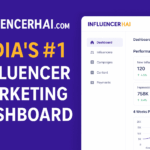The rise of the influencer economy has attracted the attention of various agencies, including talent agencies, PR firms, and influencer marketing agencies. These agencies are increasingly playing a crucial role in the influencer industry by safeguarding the interests of both influencers and brands.
For influencers, agencies can help negotiate deals, manage contracts, and provide legal support. They can also assist with brand partnerships, helping influencers identify and collaborate with brands that align with their brand and values.
For brands, agencies can provide valuable insights into the influencer landscape, identifying the most relevant and effective influencers for their marketing campaigns.
They can also help with campaign planning and execution, ensuring that influencers meet the brand’s expectations and that the campaign runs smoothly.
Agencies can mediate between influencers and brands, helping to resolve any issues or disputes that may arise during a campaign. This can be particularly helpful when misunderstandings or disagreements about deliverables or compensation exist.
Overall, as the influencer economy continues to grow and evolve, agencies will likely continue to play a vital role in ensuring the sustainability and success of the industry.
Finned Media was founded in 2021 by Ayush Shukla, a 21-year-old who saw an opportunity to create a niche agency focused on financial influencers.
With the growing popularity of social media creators, especially in the finance and investing space, Shukla recognized the potential to create a business that helps connect financial influencers with brands looking to reach this audience.
Finned Media’s unique focus on financial influencers sets it apart from more general influencer agencies and allows it to provide specialized services to both influencers and brands in this space.
By working exclusively with financial influencers, Finned Media can better understand this niche market and provide more tailored support to its clients.
As the creator boom continues, it will be interesting to see how agencies like Finned Media continue to evolve and shape the influencer industry.
Audience consumption has significantly changed in recent years due to several factors, including the rise of digital media and the increasing content available across multiple platforms and devices. Here are some of the key ways in which audience consumption has changed:
Audiences increasingly consume content online with the increasing availability of high-speed internet and the widespread adoption of smartphones and other digital devices.
This has shifted away from traditional media, such as television and print, towards digital media, such as streaming services, social media, and online publications.
One of the most significant changes in audience consumption is the move towards on-demand viewing. Streaming services like Netflix, Amazon Prime Video, and Hulu have disrupted the traditional TV model by allowing audiences to watch shows and movies whenever they want.
This has led to a rise in binge-watching and changed how audiences engage with content.
The widespread use of smartphones has shifted towards mobile-first consumption, with audiences increasingly accessing content on their phones rather than desktop or laptop computers.
This has led to changes in content format and design, with shorter and more visual content becoming more popular.
Social media platforms like Facebook, Instagram, and TikTok have become significant content sources for many audiences. Social media has enabled new content creation and consumption forms, such as short-form videos, live streams, and user-generated content.
The changes in audience consumption have been driven by the increasing availability of digital media and audiences’ changing preferences and behaviors. As technology evolves and new platforms and devices emerge, audience consumption will likely change and grow.
Creating communities has become an increasingly popular strategy for companies looking to build brand loyalty and engage with their audiences more meaningfully. Here are some key steps that companies can take to create communities:
Creating a community requires a long-term commitment from companies and a willingness to engage with members meaningfully. By building a strong community, companies can create a loyal customer base and build a powerful brand that resonates with their audience.
Regulations can positively and negatively impact growth depending on how they are implemented. On the one hand, rules can create a more stable and predictable environment that can encourage businesses to invest and grow.
Regulations can also create a level playing field and prevent companies from engaging in unfair or anti-competitive practices.
On the other hand, excessive or poorly designed regulations can stifle innovation and growth by creating unnecessary barriers to entry or imposing significant compliance costs on businesses.
In some cases, rules can also create unintended consequences that harm businesses and consumers.
Overall, regulations must promote growth and protect consumers and the public interest. Rules should be designed to address specific market failures or risks while minimizing unnecessary burdens on businesses.
When implemented effectively, regulations can help create a more sustainable and inclusive economy that benefits businesses, consumers, and society.
The influencer economy and the rise of communities have created new business opportunities and challenges. As more companies leverage these trends to build brand loyalty and engage with their audiences, it is essential to approach them with a clear strategy and a focus on providing value to consumers.
Additionally, regulations can be essential in creating a stable and fair environment for businesses to grow. Still, they must be carefully designed to avoid unintended consequences that could harm the economy.
By embracing these trends and approaching them thoughtfully, businesses can build stronger, more resilient brands better equipped to succeed in the rapidly evolving digital landscape.
